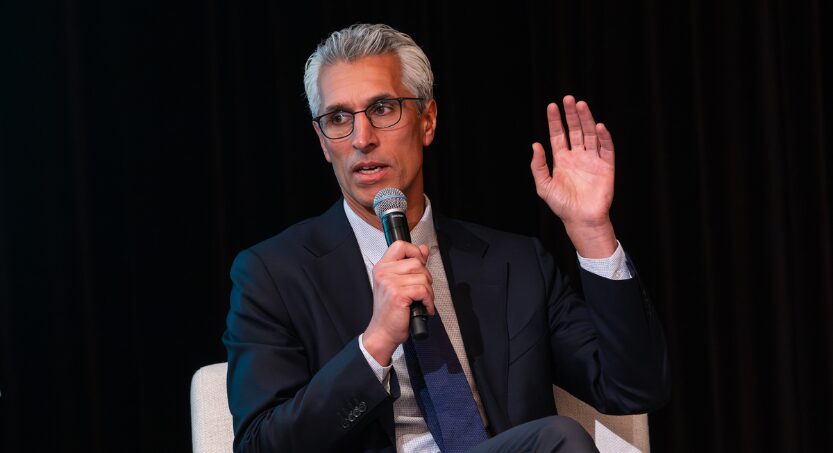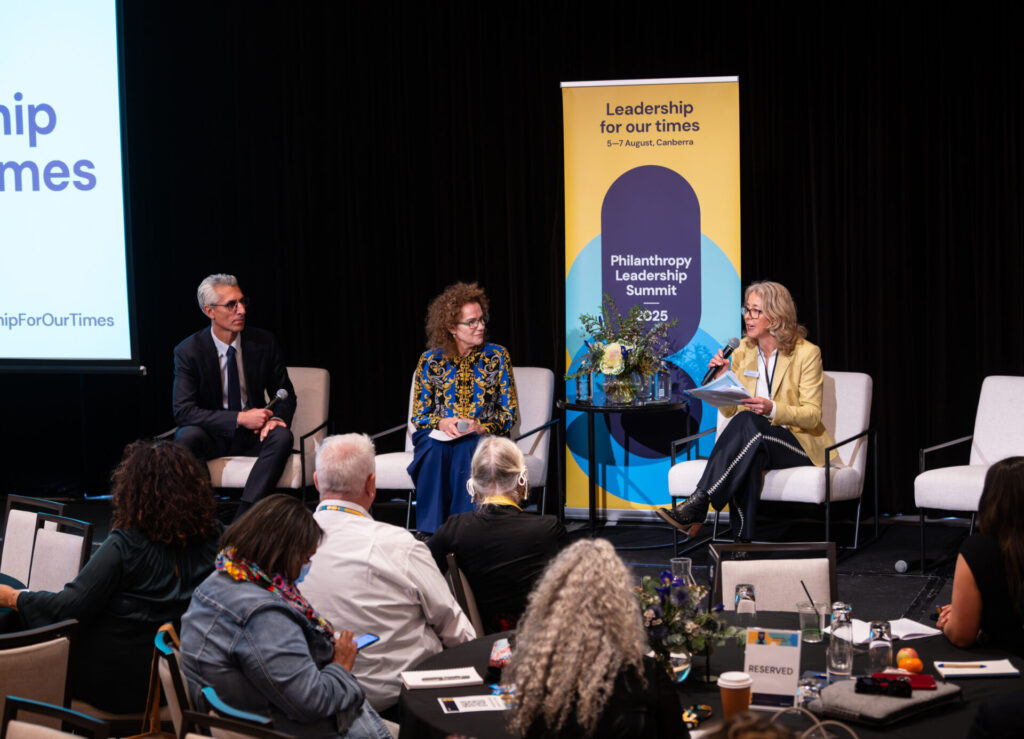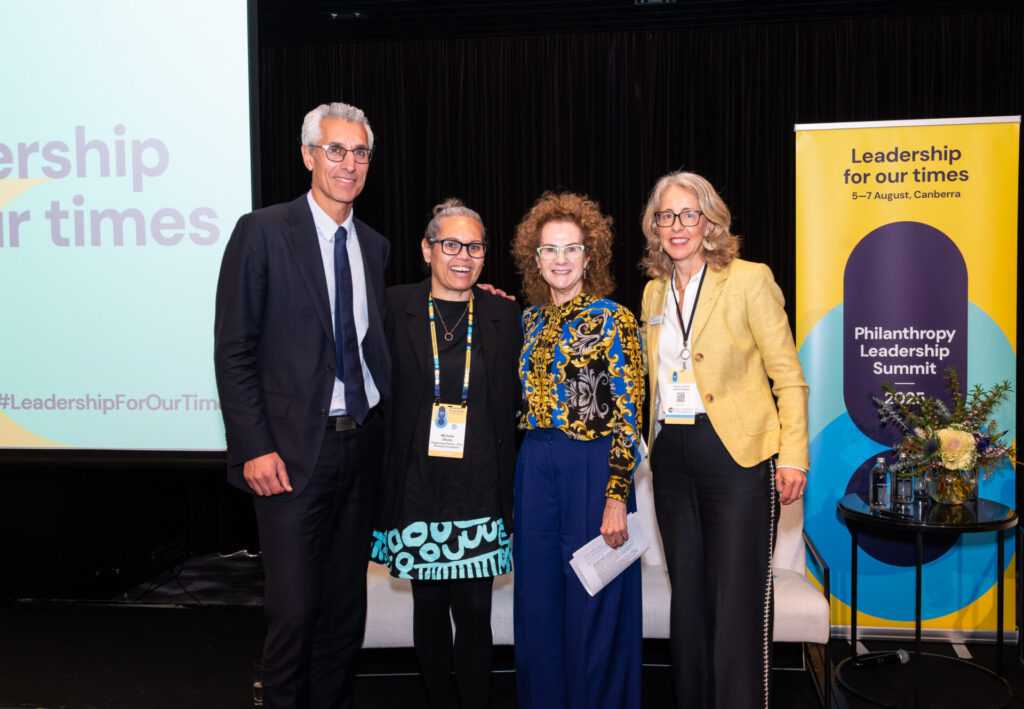Hugh de Kretser: ‘When human rights are respected, our societies are stronger, healthier and safer’

The President of the Australian Human Rights Commission sat down this week with Giving News to discuss how he’s seen philanthropy become more confident in backing advocacy during his career. Hugh spoke at the Philanthropy Leadership Summit 2025. In this Q&A, he says human rights principles provide a framework for navigating the polycrisis, societal polarisation and the rise in racism we’re seeing in Australia.
Giving News (GN): How has philanthropy crossed over with your career and what impact has philanthropy’s growing support of advocacy had?
Hugh de Kretser (HK): My first experience with philanthropy was around 2004 or 2005 when I was managing a community legal centre in Melbourne’s outer west. Two strong advocates for First Nations communities and justice, Antoinette Braybrook and Debbie Kilroy, came to my office and said that we needed to establish a prisoner legal service and apply for a grant from the Reichstein Foundation. I didn’t know what philanthropy or the Reichstein Foundation were at that point.
Then I was at the Human Rights Law Centre for almost 10 years from 2013 and had to fundraise $3m to $4m a year because we got next to no government funding. I engaged a lot with philanthropy and enjoyed strong relationships over a long period. I’m so grateful for that support.
I’ve seen a shift in philanthropy in a very positive direction towards supporting changes to laws and policies as a way to improve people’s lives and the environment. That’s been helped by legal cases and legislation that confirmed it’s appropriate and legal for philanthropy to support advocacy. It’s also come from leadership in the sector, such as The Power of Advocacy report by Philanthropy Australia and supported by The Myer Foundation and The Reichstein Foundation, which I was involved in.
It’s been great to see philanthropists become more confident in supporting advocacy along with a greater understanding about its impact and necessity.

GN: How can philanthropy improve or expand its advocacy impact?
HK: To be successful in policy advocacy, you need a sophisticated understanding of how change happens. A non-profit backed by philanthropy can do fantastic work to support a particular reform but it may not succeed because of factors outside of their control. That doesn’t mean it wasn’t worthwhile work to fund and or to continue to fund.
The political scientist John Kingdon talks about ‘policy windows’ – the moment when conditions are right for significant policy reform to happen. Certain things need to happen for a policy window to open and reform to succeed. If you’re not ready in that moment, your reform won’t happen and the opportunity might not come around again for a generation. So there needs to be a long-term approach in philanthropy for advocacy to be ready when the window opens.
GN: You said at the Leadership Summit that human rights principles provide a framework to navigate the polycrisis. Can you expand on that?
HK: There’s a genius in the modern human rights framework in that it helps governments and society to navigate really difficult policy issues. It does that by outlining the rights everyone has regardless of who they are. If a government is planning a policy initiative, whether it’s on protest rights or public health, they need to ask, is this going to limit a human right? Is it for a legitimate purpose? If it is, how can I achieve it in a way that is less restrictive of human rights?
Human rights are founded in principles of freedom, equality, respect, kindness and looking out for each other. When human rights are respected, our societies are stronger, healthier, more prosperous and safer. They’re the blueprint for a good life for everyone.
We need to strengthen the protection of human rights. One of the missing gaps is an Australian Human Rights Act that lists in one place the rights that everyone in Australia has. A Human Rights Act would protect our rights in law, promote a culture of understanding rights and give people the power to take action if their rights are breached.
It’s long overdue. It would help to deal with the division, polarisation and threats to democracy we’re seeing.
GN: Your said your time leading the Yoorrook Justice Commission changed you and your worldview for ever. Can you tell us more? There have been positive developments in Victoria in relation to the Treaty, but where to now for addressing injustices against First Australians nationally?
HK: When I think about why the Voice referendum failed, the lack of understanding about the history of injustice against First Peoples and how that history is connected to injustice today is really apparent. At Yoorrook, I saw the power and importance of truth-telling in terms of social understanding of that history of injustice. While progress on the Uluru Statement has stalled at the national level, I think the door is slightly open to national truth-telling.
The work that the Australian Human Rights Commission did on the Bringing Them Home report in 1997 built on the advocacy of survivors of the Stolen Generations and highlighted the injustice of those policies. It was part of the shining light of understanding that led to Prime Minister Kevin Rudd’s apology and redress schemes in every jurisdiction except for Queensland.
Humans are, I think, naturally empathetic. If we understand injustice, we’re more likely to support action to address it. I look at the role philanthropy played in getting behind marriage equality and giving that campaign sufficient resources to be able to tell the stories of LGBTQI+ families and couples in a way that built empathy across the Australian community and led to success.
We need truth-telling on a national level to build understanding of the need to address injustice against First Nations people.

GN: You’ve said that the biggest issue you’ve been dealing with is racism. How do we find common ground and the emotionality needed to understand each other when there’s such polarisation? What role can philanthropy play?
HK: Racism has been the issue that’s occupied me the most in my first year in this job. There is racism against First Peoples, which is enduring and so harmful and rose after the failed Voice referendum. We’ve also seen sharp rises in racism against Jewish, Israeli, Muslim, Palestinian and Arab communities. It’s fractured our society and impacted on organisations. The anti-immigration rallies we saw on the weekend show how acute the problem is.
These issues have been particularly difficult for the arts, social justice, universities and philanthropy because of issues like artistic and academic freedom, and how to reconcile the intersection of freedom from discrimination and vilification and freedom of speech.
This is where I look at human rights principles as a compass to guide us. A human rights framework says, how can we maximise those intersecting rights to the greatest extent? The Commission is doing a major study Racism@Uni examining the prevalence of racism at universities and how to address it.
We also have a project called Seen and Heard, which is working with communities in Australia affected by the violence in the Middle East. I’ve spoken to a lot of people impacted by these issues. Each form of racism has unique aspects. But there are also common elements to all forms of racism including dehumanisation, fear, the way it makes people shed their identity and retreat from public and the damage it causes to people’s self-esteem and wellbeing. We launched our National Anti-Racism Framework last year, which is a whole-of-society set of recommendations to respond to and eliminate racism in our country.
To help to address the polarisation we are seeing, we need to create safe and constructive spaces for the difficult conversations where we can find common ground. It’s absolutely critical for us to find those spaces. Social media does the opposite. It drives and monetises division. Part of the answer is addressing mis- and disinformation online.
Philanthropy has a leadership role to play in supporting organisations that are leading work to address racism and promoting human rights in a systemic way. Human rights education is one of the keys to strengthening our democratic foundations and bringing us together as a society around shared values.
GN: Where do you see human rights in 2050? How can we create a more positive picture of a future cohesive Australia?
HK: It’s a critical moment right now for Australia and the world. We need to choose the right pathway. At the Commission, we’ll be doing everything we can to strengthen the global standards that governments agreed to in 1948 when they stood together after World War 2, said, ‘never again’ and adopted the Universal Declaration of Human Rights. These are the standards that we commit to uphold so that everyone can have a decent, dignified and safe life.
Hugh de Kretser commenced his five-year term as President of the Australian Human Rights Commission on 30 July 2024. Before joining the Commission, he was the CEO of the Yoorrook Justice Commission, the first formal truth-telling process into historical and ongoing injustices experienced by First Nations people in Victoria. He previously worked as the Executive Director of the Human Rights Law Centre and the Executive Officer of the Victorian Federation of Community Legal Centres, among other advisory and governance roles.